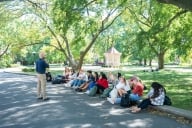You have /5 articles left.
Sign up for a free account or log in.
When I was a graduate student, I hoped that one day I'd make it to the "meat market" – the interviews at the American Historical Association convention, where history departments interview candidates for tenure-track jobs. Freshly-minted Ph.D.s travel to Boston, Chicago, or New York during one of the most expensive travel times of the year for initial interviews.
Once, when the AHA was held in San Francisco, I attended and watched my former teaching assistant interview. Rooms were in such short supply that the university could not get an interview suite and she had to shout to be heard above the din of the cocktail lounge to make the case for why she should get one of the three on-campus interviews. Needless to say, the "meat market" is really not the best way to determine who is best for the job, since it requires graduate students to spend money at a time in their academic lives when they may have little of it, and it takes place in an artificial environment where it's difficult for people to show who they really are.
Now some history departments like mine have tried Skype to do initial screening interviews, and I think that it is a much more humane and effective method of seeing who is best for the job. At first, I thought that using Skype was useful because it is free, but that we should return to the AHA when the economy improves. But now I feel that interviewing via Skype is a better way to find the best job candidates.
Why? Because job-seekers are not required to travel across the country and the world to pay for the opportunity to be interviewed, and they have more control over the presentation of self. Instead of all the candidates appearing relatively the same in a sterile environment, the job candidates interview in their own offices or even kitchens, taking the opportunity to position themselves to best advantage.
My university has been fortunate since we are hiring while other universities have been cutting positions. Our dean gave us flexibility in how we would use limited search funds, so we decided to opt out of the AHA and to use video conferencing for our public history position in 2009 and Skype for our ancient/medieval position in 2010.
The video conferencing was inferior to Skype because it involved significant cost to book video conferencing rooms at our university and at the job candidates' universities. The candidates had little experience with video conferencing, so both the search committee and those being interviewed were uncomfortable and stiff sitting in a conference room waiting to be cued for the conversation to start. We watched as candidates sat at the conference table squirming, sometimes for 15 minutes or more as our committee members gathered. The search committee members sprinted from our offices on one side of campus to the video conference room on the other side of campus, sometimes arriving winded. It was certainly better to see the person being interviewed rather than to speak to a disembodied voice in a telephone interview, but the expense and the logistical problems made video conferencing a less than perfect way to do initial interviews.
This year we thought that ancient/medieval historians were likely old hands at Skype, since they would have been working at archeological sites or archives across the globe while communicating with friends and colleagues at home, and that turned out to be true. We interviewed more people via Skype (20) than we would have at the AHA (10). We were able to spread the interviewing process over the course of weeks, and we were able to have really enjoyable conversations, since the candidates seemed much more at ease than they might have been at the "meat market."
It was striking how beautifully some of the candidates communicated with us, filling the screen with their laughter and wit, and showing real enthusiasm and capacity to bridge the digital space between us. I think that students today prefer to communicate via their electronic devices rather than in person, so these candidates showed that they were already doing that in a big way. Some of the candidates staged their interview so appealingly -- with artfully placed key titles in the background -- that their image gave the impression that it was the book jacket photograph on their first published book. Other candidates were interviewing between classes, standing before 12-foot-high European casement windows of their university offices while gray northern light streamed through, projecting their competence and professional experience. And one candidate who was living in an 18th-century farmhouse delightfully scanned the camera 360 degrees so that we could enjoy a view of the rustic space in which she was living.
Far from being a stopgap measure, I think that Skype is a better way to do initial screening than going to an academic conference. It is not just less expensive, but it is more humane, since it takes the burden of paying for the initial interview off the job candidate. But finally it is better because it allows candidates to control the environment of their interview, to stage the presentation of self, and to give us more clues about the person they really are than we would ever have in a sterile conference environment.








